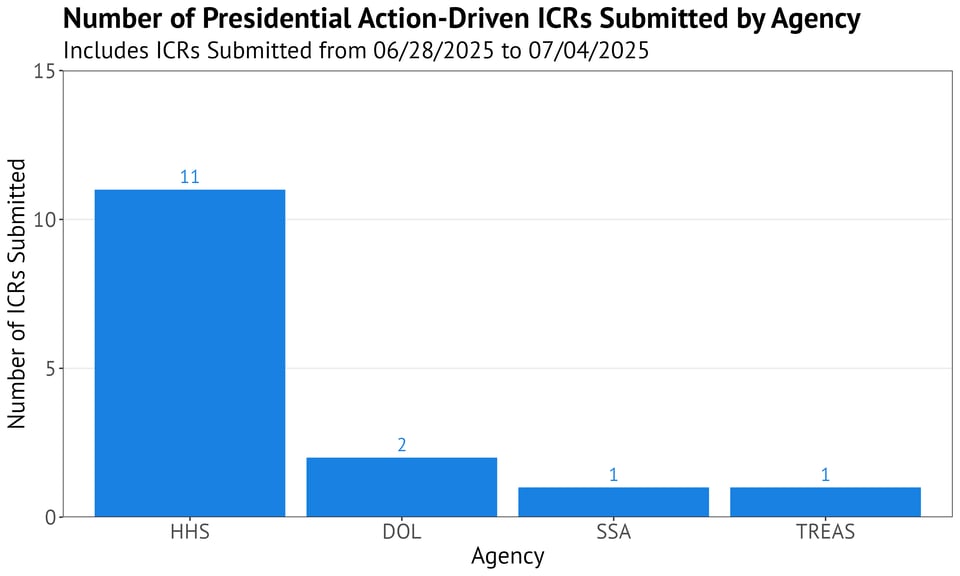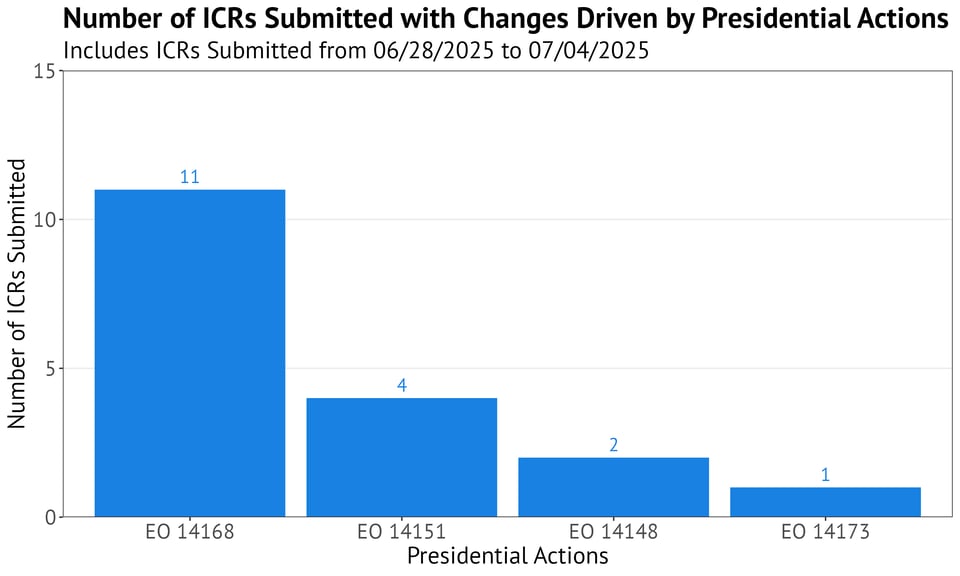by Melanie Klein
Since January 20, 2025, new Presidential Actions, such as Executive Orders and Proclamations, have required federal agencies to subtly adjust what information they gather and how they ask for it. This is especially true when it comes to language about gender and diversity, equity, and inclusion (DEI). Federal data collections leave a digital trail on RegInfo.gov as they evolve, but some footprints are easier to spot than others.
Tracking ICR Activity
Between June 28 and July 4, 2025, 88 Information Collection Requests (ICRs) were submitted.
15 of the 88 ICRs were identified as having been submitted with changes in response to Presidential Actions.
7 of the 15 ICRs requested a “no material or nonsubstantive change to a currently approved collection.” This means minor changes can be made without extending the collection’s expiration date. Because these revisions don’t trigger a public comment period or a notice in the Federal Register, they can easily fly under the radar and move through a fast approval process.
11 of the 15 ICRs were submitted by the Department of Health and Human Services (HHS).

Presidential Actions Behind These Changes
Carefully reviewing each ICR from June 28 to July 04, 2025, allowed us to pinpoint exactly which Presidential Actions agencies used to justify their proposed changes:
11 ICRs driven by EO 14168: Defending Women from Gender Ideology Extremism and Restoring Biological Truth to the Federal Government, January 20, 2025
4 ICRs driven by EO 14151: Ending Radical and Wasteful Government DEI Programs and Preferencing, January 20, 2025
2 ICR driven by EO 14148: Initial Rescissions of Harmful Executive Orders and Actions, January 20, 2025
1 ICR driven by EO 14173: Ending Illegal Discrimination and Restoring Merit-Based Opportunity, January 21, 2025

Notable Changes
To illustrate how Presidential Actions have shaped recent updates to data collections, here are 3 notable changes:
Treasury removed SOGI subcategories from its EEO Complaint Form
The Department of Treasury submitted a revision request on June 30, 2025, for its Equal Employment Opportunity (EEO) Complaint Form. Citing EO 14168, the supporting statement detailed the removal of the sexual orientation and gender identity (SOGI) subcategories under “sex.” Numerous comments were received in response, including from 12 members of Congress–all of which objected to the removal of SOGI references. Treasury noted that many of the comments cited “the Supreme Court opinion in Bostock v. Clayton County, Georgia, 590 U.S. 644 (2020) that the prohibition on sex discrimination in Title VII of the Civil Rights Act of 1964 prohibits discrimination based on sexual orientation and gender identity.” In response, Treasury stated that employees may still submit employment discrimination complaints related to sexual orientation and gender identity by selecting “sex” as the basis for the complaint.
CMS eliminated health equity measures from quality-of-care metrics for Medicare beneficiaries
The Centers for Medicare & Medicaid Services (CMS) submitted a revision request on June 30, 2025, for the Hospital Inpatient Quality Reporting Program, which collects quality-of-care metrics for Medicare beneficiaries. The supporting statement detailed the removal of the following measures: Hospital Commitment to Health Equity, Screening for Social Drivers of Health, and Screen Positive Rate for Social Drivers of Health. Although no Presidential Action was explicitly cited, the change is likely attributable to EO 14151.
HRSA deleted cultural competency from rural health program measures
The Health Resources and Services Administration (HRSA) submitted a nonsubstantive change request on July 1, 2025, for performance measures associated with the Small Health Care Provider Quality Improvement Grant Program, which supports rural primary care providers. The change memo detailed three revisions, all justified by the rationale that “these data are not being used to assess program performance.” First, “Migrant Health Center” was removed as a response option for Member Organizations in the Consortium/Network. Second, “cultural competency” was removed as a response option for Approaches to Quality Improvement. Third, the definition of “cultural competency” was deleted. Previously, it was defined as “the provision of culturally and linguistically appropriate services that are respectful of and responsive to the health beliefs, practices and needs of diverse patients.”Although no Presidential Action was explicitly cited, HRSA noted that these changes were made to align with this Administration’s priorities.
How to Stay Informed
Our ICR tracker at dataindex.us is updated daily with newly scraped data to surface these changes as they are proposed. We review every ICR on a weekly basis so you don’t have to, and our weekly newsletter posts highlight the latest developments. These quiet shifts in the federal data landscape may seem small, but they deserve our attention.
Sign up for our newsletter, and follow us on Bluesky and LinkedIn.
